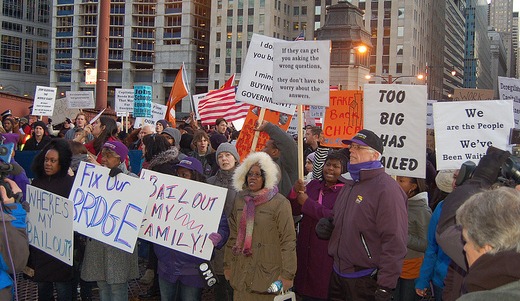
The following is a report to the National Board of the Communist Party USA by Political Action Chair Joelle Fishman.
Across the country today, Nov. 17, are “99%” events calling for jobs to rebuild crumbling bridges and other infrastructure needs of communities. The events will highlight the American Jobs Act. They will also highlight the looming Thanksgiving deadline of the “job-killing” Super Committee, which has been charged with identifying $1.2 trillion in cuts to the deficit.
This date marks the second month of Occupy Wall Street. Hundreds of thousands are in revolt against the kind of undemocratic backroom deals favoring the big corporations and ultra rich that the Super Committee represents.
In August, to avoid an immediate government shutdown, Congress agreed to $917 billion in spending cuts over a ten-year period on top of an already-reduced budget. They also created the Super Committee to make an additional $1.2 trillion in cuts.
If the Super Committee fails to come up with a proposal, a process called sequestration sets in. This would mandate cuts from domestic and military spending which would begin in 2013, excluding Social Security, Medicare and other major entitlement programs.
A major point of contention within the Super Committee is raising revenues by taxing the super rich. Most Republicans are hiding behind a pledge they signed with Grover Norquist to raise no taxes. Instead, they propose cuts to Social Security, Medicare, Medicaid and programs essential for poor and middle-income families.
There is also a deceitful message from the Republicans claiming they will consider some tax increases. Their proposal is to eliminate some tax deductions (which would also impact middle income families), but only if there is a permanent extension of the Bush tax cuts to the rich with the estate tax kept at the current low level. This equation actually increases the tax advantage for the richest 1 or 2% even more, and once again adds an additional burden on to middle and low-income earners!
The rallies today are very much on point. Putting people back to work is the way to boost the economy and therefore create the ability to reduce the deficit. Most deficit reduction measures increase unemployment, and further damage recovery. They impact most sharply on the racially oppressed, women, children and youth.
Yesterday, the Congressional Progressive Caucus held a hearing on job creation with the Economic Policy Institute and others. They said, “The American people have been clear that Congress’ top priority must be job creation. Working families reject proposed austerity measures, including deep cuts to Medicare, Medicaid, and Social Security. These cuts would have disastrous consequences for the middle class and the economy as a whole. Clearly, we must pursue other approaches to solving our economic problems.”
The Occupy uprising captures the anger of the majority who are being devastated by the economic crisis while the wealthiest take home 24% of the nation’s income, CEOs earn 530 times more than average workers and loopholes in the tax code favor ultra wealthy corporations and individuals. It is estimated that nearly one-third of African Americans are now unemployed, with youth much higher, and similar numbers for Latinos and the rural poor. Organizing this moral outrage can create significant mass pressure to impact the decision.
Most progressives agree that given the framework of the Super Committee, there can be no good deal.
On the other hand, business leaders are threatening to withhold campaign contributions until a deal is reached. They are pressuring the Super Committee to “Go Big” with cuts in spending.
There are divisions in the Democrats. A bi-partisan group in Congress also called on the Super Committee to “Go Big” and make sure to reach a “deal”.
Some Democrats also joined in support of a Republican Balanced Budget Amendment to the Constitution which needs a two thirds vote for passage. (It failed on November 18 by a 261 to 165 vote.) A Balanced Budget Amendment would eliminate 15 million jobs and double the current unemployment rate to around 20%.
What are the options from the Super Committee?
If the Super Committee does come up with a proposal it will go to the House and Senate for an up or down vote by December 23. Then it will go to the President to sign or veto.
Or, the Super Committee can come up with a proposal in which they do not spell out all the details on taxes and forward it to the House Ways and Means and Senate Finance committees.
If the Super Committee does not approve a plan, automatic cuts called sequestration will take place, half from domestic spending and half from military appropriations. However, Republicans are already lobbying that the military should be exempt from any cuts. Medicaid, SNAP, Unemployment Compensation and similar programs are to be exempted, but basic needs will be even further limited, and jobs will be lost.
These cuts are scheduled for January 2013, following the presidential election.
Or, if the Super Committee comes up with a plan that saves less than $1.2 trillion, there will be sequestration and automatic cuts to come up with the difference.
Many organizations are utilizing online petitions, and appealing for a flood of calls to the members of the Super Committee and to every Senator to oppose cuts for people’s needs and to tax the rich and cut the military. (results.org)
The SAVE coalition of 1,600 groups adopted four principles. They agreed that for any proposal to be acceptable it must:
– protect low and mod income people and programs that serve them
– include substantial jobs creation
– include substantial fair sources of new revenue: taxes on the wealthiest
– reduce wasteful spending in military and elsewhere
The defeat of SB 5 in Ohio gives leverage. In Ohio voters soundly rejected an attack on workers’ rights. Occupy has put the spotlight squarely on the top richest corporations and individuals. The message should be clear to elected officials that they will be in trouble if they give more to the top and if they mess with Social Security, Medicare and Medicaid.
Conclusions:
1. Any deal coming out of the committee will be a bad deal. At best it will have token tax increases on the rich. It will almost certainly focus on painful cuts on top of the cuts that are already taking place. We should urge committee members to reject any deal that cuts the safety net or any other useful spending. If the committee adopts such a deal, we should urge Congress and the President to reject it. Massive pressure is needed on all members of Congress to reject any deal and on the President to veto it if it comes to his desk.
2. The immediate issue is jobs, jobs, jobs. Any Super Committee deal will destroy jobs. (We should rename it the “job-killing Super Committee.”) Congress should vote no on deficit reduction, then get to work and pass the American Jobs Act!
3. If the Super Committee fails, the fight shifts to implementation of the “automatic” across-the-board cuts. The right wing will try to exempt the military budget. We should fight to tax the rich and increase job-creating spending that meets the needs of our communities.
4. No matter what agreements are reached, Republicans will not be satisfied. Every appropriations bill, every debt ceiling resolution, will be an excuse for them to demand further cuts.
5. Unless Congress acts, January 1 will be the end of federal unemployment insurance and the 2% payroll tax cut for workers. Extending these are both included in the American Jobs Act. Immediate mobilization is needed to extend these benefits.
6. The best way to defeat the extreme right wing in 2012 is to campaign for jobs vs. austerity. A campaign based on a slightly milder (Democratic) austerity vs. a more severe (Republican) austerity is less likely to succeed and, if it succeeds, will be in a weak position to resist further austerity measures.
The Super Committee was set up to act in secret to impose austerity. The issue is jobs not deficits. Jobs not cuts. Social Security, Medicare, transportation, education, infrastructure, all create jobs and meet basic needs and should not be cut. Public support to tax the rich, and also to cut military spending, continues to grow, and are majority views. The demand must be placed on Congress to implement the will of the people.


 Join Now
Join Now